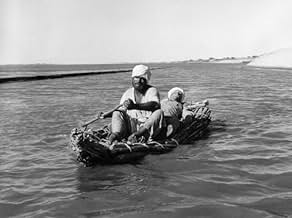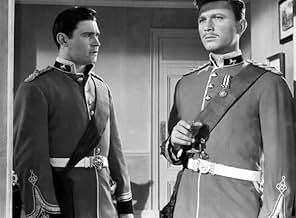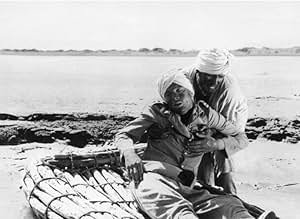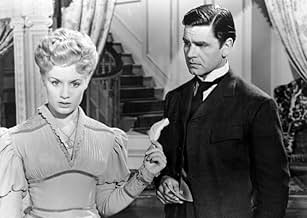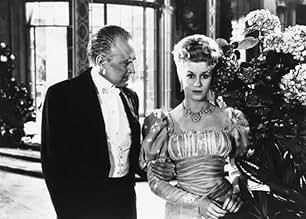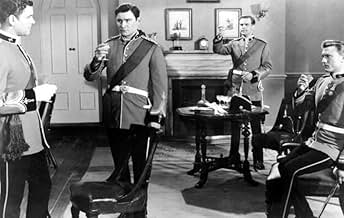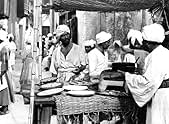NOTE IMDb
6,2/10
707
MA NOTE
Un officier britannique qui ne se sent guère de dispositions pour le métier des armes auquel l'a poussé son père est accusé de lâcheté par trois de ses amis et par la jeune fille qu'il aime.... Tout lireUn officier britannique qui ne se sent guère de dispositions pour le métier des armes auquel l'a poussé son père est accusé de lâcheté par trois de ses amis et par la jeune fille qu'il aime. Il entreprend alors de leur prouver son courage.Un officier britannique qui ne se sent guère de dispositions pour le métier des armes auquel l'a poussé son père est accusé de lâcheté par trois de ses amis et par la jeune fille qu'il aime. Il entreprend alors de leur prouver son courage.
- Réalisation
- Scénario
- Casting principal
Avis à la une
Being something of a pacifist, Harry Faversham (Anthony Steele) has the misfortune to be born into a staunchly military family with all the expectations of an overbearing father (Michael Hordern) weighing down on his shoulders. Harry toes the line to please his dad, but when the old boy pops his clogs, he swiftly resigns his commission. As a consequence, he receives a white feather (the symbol of cowardice) from each of his best friends (Laurence Harvey, Ronald Lewis, and an out-of-place Ian Carmichael) on the eve of their departure to war in the Sudan. Harry awards himself a symbolic feather on behalf of his fiancée (Mary Ure) whose disappointment is clear. Harry determines to make his former friends take back their feathers, which is the signal for much derring-do to begin (hurrah!).
The tale of the four feathers is the epitome of the schoolboy adventure yarn with heroic soldiers blinded in battle, heroic soldiers captured by the fuzzie-wuzzies (not nice, I can tell you!), heroic cowards braving forehead-branding and boot polish to go deep under cover in darkest Africa, and pompous old boors endlessly recounting their role in the battle of Balaclava back in the Crimean. It should really be boredom-proof, but the sad truth is that this version comes perilously close to inducing that state at times. The film is practically a word-for-word remake of the 1939 version – and even makes scandalously wholesale use of the earlier version's battle scenes – which means it probably came across as a bit staid back in 1955, but looks positively creaky today.
Anthony Steel isn't a particularly convincing hero: at thirty-five he's playing a twenty-five year old who somehow looks forty-five, but the problem is more in the lack of sympathy Steel creates for his character. His Harry Faversham is the sort that sits in the corner and speaks when he's spoken too, and is therefore a little too bland to be a dashing hero, despite his acts of heroism. And exactly what sort of reaction did he expect to receive when he resigned his commission? Doesn't trotting off to the desert to regain his honour in the eyes of his friends and fiancée simply negate the strength of character required to resign in the first place? A young Laurence Harvey fares better as Faversham's upper-crust chum who suffers sun blindness when hiding from the fuzzies, and would arguably have been better suited to the leading man role. Ronald Lewis has practically nothing to do, while Ian Carmichael, on the cusp of his comedy career, comes off as a plummy-voiced twit.
The film isn't awful by any standards, but it really could have benefited from fifteen minutes being pruned from its running time, and a little more fire in young Faversham's belly.
The tale of the four feathers is the epitome of the schoolboy adventure yarn with heroic soldiers blinded in battle, heroic soldiers captured by the fuzzie-wuzzies (not nice, I can tell you!), heroic cowards braving forehead-branding and boot polish to go deep under cover in darkest Africa, and pompous old boors endlessly recounting their role in the battle of Balaclava back in the Crimean. It should really be boredom-proof, but the sad truth is that this version comes perilously close to inducing that state at times. The film is practically a word-for-word remake of the 1939 version – and even makes scandalously wholesale use of the earlier version's battle scenes – which means it probably came across as a bit staid back in 1955, but looks positively creaky today.
Anthony Steel isn't a particularly convincing hero: at thirty-five he's playing a twenty-five year old who somehow looks forty-five, but the problem is more in the lack of sympathy Steel creates for his character. His Harry Faversham is the sort that sits in the corner and speaks when he's spoken too, and is therefore a little too bland to be a dashing hero, despite his acts of heroism. And exactly what sort of reaction did he expect to receive when he resigned his commission? Doesn't trotting off to the desert to regain his honour in the eyes of his friends and fiancée simply negate the strength of character required to resign in the first place? A young Laurence Harvey fares better as Faversham's upper-crust chum who suffers sun blindness when hiding from the fuzzies, and would arguably have been better suited to the leading man role. Ronald Lewis has practically nothing to do, while Ian Carmichael, on the cusp of his comedy career, comes off as a plummy-voiced twit.
The film isn't awful by any standards, but it really could have benefited from fifteen minutes being pruned from its running time, and a little more fire in young Faversham's belly.
This is a remake of the classic 1930' s movie The Four Feathers ,with directorial chores being split between Terence Young ( soon to be a James Bond helmsman) and Zoltan Korda ,whose brother Alexander produced the earlier version The movie is faithful both to the earlier picture and the source novel by A E W Mason .It tells how Harry Faversham is unjustly accused of cowardice when resigning his commission in the British army on the eve of the war in the Sudan against the Mahdi (For a fuller cinema treatment of the conflict see the Heston -Olivier picture "Khartoum ") 3 of his friends and his fiancée hand him white feathers ,emblematic of cowardice .Faversham disappears from London society and travels to Africa and disguises himself as a native ,in which role he comes to the aid of one of his accusers
Their is a slightly cheapskate air about the production whose battle scenes are largely taken from footage shot for the earlier movie .The acting is pretty wooden -espaecially from Anthony as Faversham and Laurence Harvey as his chief accuser .The peppy cameo from James Robertson Justice as a crusty old general adds needed vigour to the acting department as does a pre Hammer movies Christopher Lee as a native tribesman The movie is not downright bad but it lacks the brio and pace that would have lifted it a notch or two higher and overall is competent but slightly plodding
Their is a slightly cheapskate air about the production whose battle scenes are largely taken from footage shot for the earlier movie .The acting is pretty wooden -espaecially from Anthony as Faversham and Laurence Harvey as his chief accuser .The peppy cameo from James Robertson Justice as a crusty old general adds needed vigour to the acting department as does a pre Hammer movies Christopher Lee as a native tribesman The movie is not downright bad but it lacks the brio and pace that would have lifted it a notch or two higher and overall is competent but slightly plodding
A lot of critics gave this movie a really hard time. I never read critical reviews until I've seen a film and I must confess that I thoroughly enjoyed this one. Maybe it did use footage from a previous shoot and there were certainly flaws. But all in all, this was a good schoolboy yarn. I liked the lengthy build up to the scenes in Sudan, it really helped set the scene and made you care about the characters. The plot lingered long enough to give the viewer a feel of the longevity of the piece. The plot was well moved along and there was suitable emotion shown. James Robertson Justice so often just barks out his lines and in this movie he....Well, just barked out his lines! A real shame. A small blemish on an otherwise enjoyable movie.
If you're going to clone something in Hollywood, clone something good which is what Storm Over The Nile is. It is yet another remake of the famous novel The Four Feathers. The same treatment was afforded Dawn Patrol by Warner Brothers back in the Thirties when the first version with Douglas Fairbanks, Jr. was cloned into the second with Errol Flynn.
The script from the classic British production from 1939 was used as well as all the battle sequences. That was a wise thing because in 1939 the British controlled the Sudan and were able to film their action sequences on the very spot where these things occurred back in the late 19th century. Not to mention that it certainly saved big time on the budget.
Anthony Steel plays our protagonist Harry Fevasham who questions his own courage when he's about to be shipped into action in the Sudan. Steel is from a military family and there are reasons of tradition and obligations that force him into that life. His brother officers brand him a coward and send him a white feather as the symbol of same.
Some time later Steel goes to the Sudan and lives as an Arab tribesman and in that role performs some truly heroic feats. Best as always is his saving Laurence Harvey who is one of his accusers who is now blind as a result of prolonged exposure to the desert sun. Harvey's role was done in 1939 by Ralph Richardson.
James Robertson Justice is also in the cast playing a really good John Bull type character. He's the father of Mary Ure who was supposed to marry Steel before his resignation and the feathers. JRJ always adds a lot to any film he's ever in.
The Four Feathers with its story about a man questioning his courage and finding out truly if he has the right stuff is in the British culture very much akin to The Red Badge Of Courage. That has only had one film adaption whereas The Four Feathers has had many. Beau Bridges did one in the Seventies and the late Heath Ledger starred as Harry Fevasham in the latest screen version.
But only the 1939 and 1955 can boast actual on scene location shooting. And unless the Sudan changes radically were not likely to see another.
The script from the classic British production from 1939 was used as well as all the battle sequences. That was a wise thing because in 1939 the British controlled the Sudan and were able to film their action sequences on the very spot where these things occurred back in the late 19th century. Not to mention that it certainly saved big time on the budget.
Anthony Steel plays our protagonist Harry Fevasham who questions his own courage when he's about to be shipped into action in the Sudan. Steel is from a military family and there are reasons of tradition and obligations that force him into that life. His brother officers brand him a coward and send him a white feather as the symbol of same.
Some time later Steel goes to the Sudan and lives as an Arab tribesman and in that role performs some truly heroic feats. Best as always is his saving Laurence Harvey who is one of his accusers who is now blind as a result of prolonged exposure to the desert sun. Harvey's role was done in 1939 by Ralph Richardson.
James Robertson Justice is also in the cast playing a really good John Bull type character. He's the father of Mary Ure who was supposed to marry Steel before his resignation and the feathers. JRJ always adds a lot to any film he's ever in.
The Four Feathers with its story about a man questioning his courage and finding out truly if he has the right stuff is in the British culture very much akin to The Red Badge Of Courage. That has only had one film adaption whereas The Four Feathers has had many. Beau Bridges did one in the Seventies and the late Heath Ledger starred as Harry Fevasham in the latest screen version.
But only the 1939 and 1955 can boast actual on scene location shooting. And unless the Sudan changes radically were not likely to see another.
I had the advantage of watching Zoltan Korda's 1939 'The Four Feathers' on one afternoon and this his 'Storm over the Nile' on the next and since there have been at least 5 versions filmed cannot understand why it was not issued as 'The Four Feathers' or more appropriately 'The Two Feathers' as those given to Lieutenants Thomas Willoughby and Peter Burroughs were largely irrelevant to the plot although getting Harry Faversham flogged in the original and just incarcerated in the second ? One could believe John Clements considered himself a Coward but not Anthony Steele. I would cross the street and a few deserts for Mary Ure but not June Duprez- she deserved the far from noble Ralph Richardson but not Laurence Harvey who started off the sequel. Laurence Harvey started off with a reddish brown rat on his forehead which might well have saved him from Retinal damage when his lost his Hat. Indeed it is hard to select a single Actor or Actress who was better in the original and usually considered superior version but that is after we have watched both. As a stand alone Storm over the Nile is both more watchable and allowed Zoltan Korda to clean up several nonsenses from his original. Such as how and why John Durrance became sun blind. Ralph Richardson leading his troops keeping that he was blind a secret. The hovering vultures and other reasons why LH tries more convincingly to shoot himself. How Harry Faversham passed over the so important File and the Mahdi's guards searching them for it. All in all certainly not deserving the criticism - who shouldn't any Director use the same footage twice or shoot an overlong schedule and then divide it into two ? Nobody has to pay to watch any Film or spend the time glued to the telly.
Le saviez-vous
- AnecdotesRe-used a great deal of stock footage from Les quatre plumes blanches (1939), including the entire final battle sequence.
- GaffesHooded vultures are shown making many and various calls. The species, in common with other Old World vultures, is largely silent.
- Crédits fousOpening credits prologue: In 1885 the rebellious army of dervishes enslaved and killed many thousands of defenceless natives in the Sudan. Then laid siege to Khartoum. The scanty garrison's heroic commander, General Gordon appealed for help from England - but no help reached him.
- ConnexionsEdited from Les quatre plumes blanches (1939)
Meilleurs choix
Connectez-vous pour évaluer et suivre la liste de favoris afin de recevoir des recommandations personnalisées
- How long is Storm Over the Nile?Alimenté par Alexa
Détails
- Date de sortie
- Pays d’origine
- Langue
- Aussi connu sous le nom de
- Zoltan Korda's Production Storm Over the Nile
- Lieux de tournage
- Sociétés de production
- Voir plus de crédits d'entreprise sur IMDbPro
- Durée
- 1h 47min(107 min)
- Rapport de forme
- 2.55 : 1
Contribuer à cette page
Suggérer une modification ou ajouter du contenu manquant

